Election results: Leader-by-leader - how have they done?
- Published
How the campaigns went for each of the party leaders and what they did - or didn't - achieve.
David Cameron
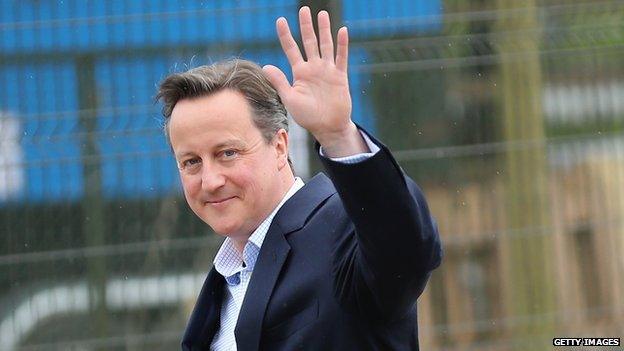
Job: Conservative Party leader since 2005
Age: 48
Electoral history: MP for Witney since 2001. Led Conservatives to gain 97 seats in 2010 and become the largest party in the House of Commons with 307 seats. The party did not get a majority (at least 325 seats) - and swift talks to form a tradition-busting coalition with the Lib Dems led to him becoming prime minister.
How's his campaign gone? David Cameron had what was widely described as a safety-first campaign, with the core messages of sticking with the Conservatives to ensure economic recovery and warning that a Labour government propped up by the SNP would cause chaos. In the final week he rolled up his sleeves and said he was "pumped up" after critics suggested a lack of passion.
And how did he do? Personally, Mr Cameron got re-elected into his safe seat of Witney with more than 35,000 votes - more than 25,000 ahead of his nearest rival. As a party leader, the latest forecast is that he is on course for 331 seats out of 650 - compared to 307 in 2010. So this represents a huge achievement - only once before in recent history has an incumbent government increased its majority, and that was Mrs Thatcher in her prime in the 1980s. However, this is a small majority which, say correspondents, means he may be vulnerable to pressure and potential revolts from his backbenches.

Ed Miliband
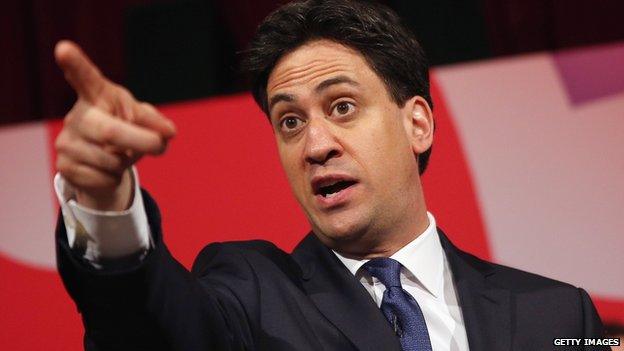
Job: Labour leader since 2010
Age: 45
Electoral history: MP for Doncaster North since 2005. This was his first general election as Labour leader.
How's his campaign gone? Ed Miliband went into the campaign facing questions about his character from political rivals and questions about how he would stand up to the relentless pressure and scrutiny of the campaign. He was widely seen to have exceeded (admittedly low) expectations during the campaign, and pre-vote polling raised speculation that Mr Miliband might even be in a position to negotiate form a minority government on 8 May.
How did he do? Voters emphatically dashed Mr Miliband's hopes of achieving a majority or even enough MPs to be able to put together a deal with other parties to form a government, with Labour forecast to have won just 232 seats. Mr Miliband himself was re-elected in his safe Labour seat of Doncaster North - winning 20,708 votes compared to his nearest rival's 8,928 - but hours after the result announced he was resigning as party leader, saying he was "truly sorry" he did not succeed and that it was "time for someone else" to take over.
His leadership had already been criticised from within his own party, with Labour peer and former first minister of Scotland, Lord McConnell, saying: "We had no answers on Europe, we had no answers on this issue of disengagement of people with politics in the centre, we seem to be offering just simply more of the same."

Nick Clegg
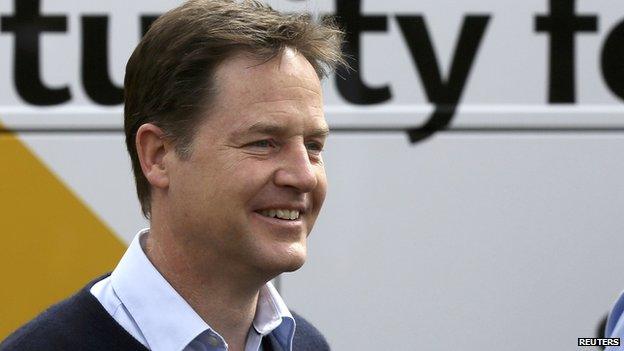
Job: Lib Dem leader since 2007
Age: 48
Electoral history: MP for Sheffield Hallam since 2005. He led the Lib Dems into the 2010 election when the party got nearly one in four votes cast, but just 57 out of 650 MPs. The party, which for decades had been out of power, sprung a surprise by going into coalition with the Conservatives. Its poll ratings almost immediately fell and never recovered.
How did the campaign go? Mr Clegg spent much of the past five years as the most unpopular of the UK's senior politicians, with his party slumping in the polls and his personal ratings in huge negative territory even before his U-turn on student tuition fees. This campaign went pretty well, from that low base, but with none of the "Cleggmania" seen in 2010. He again did OK in the TV debates and seemed to enjoy the chance to defend, unrestricted, his decision to go into coalition.
And what about the results? Mr Clegg managed to hang on to his Sheffield seat - with 22,215 votes compared to Labour's 19,862 - but there was a collapse in his party's overall standing from 57 seats to a forecast eight. Big names to go included three former cabinet ministers - Energy Secretary Ed Davey, Business Secretary Vince Cable and Treasury Secretary Danny Alexander. Mr Clegg resigned as leader of the Liberal Democrats on Friday morning after admitting the results were "immeasurably more crushing" than he could have feared. But he insisted there was a "way back" and promised his party it "would win again".

Nigel Farage
UKIP's Nigel Farage: "On a personal level I feel an enormous weight has been lifted from my shoulders"
Job: UKIP leader since 2010 (and between 2006 and 2009)
Age: 51
Electoral history: MEP First elected to the European Parliament in 1999, representing the south-east of England. A failed attempt to unseat the Commons Speaker, John Bercow, in Buckingham at the 2010 general election was followed by UKIP victory in the 2014 European elections, which Mr Farage called a political "earthquake". More was to come when two Conservative MPs, Douglas Carswell and Mark Reckless, resigned their seats and won the resulting by-elections for UKIP.
How did the campaign go? Nigel Farage had to balance UKIP's national drive for votes with his personal battle to get elected in South Thanet, Kent. UKIP's campaign, which was expected to loom large over the election, at times appeared more muted than expected, and Mr Farage revealed he had been receiving hospital treatment for a chronic back condition in the early stages.
What happened? Mr Farage himself failed to get elected in South Thanet, coming second to the Conservatives, and the party looks like it has gone from the two MPs it had at the end of the last parliament, to just one - Douglas Carswell in Clacton. But UKIP came third in terms of total percentage of the vote - polling at about 12.6% vote share which was up more than 9% on 2010 and equated to nearly four million votes.
Mr Farage himself said he had "never felt happier" and that a weight had been lifted off his shoulders, after losing his seat. He promised UKIP would lead the push for "real, genuine radical political reform" so Britain could "get back its democracy".
His party will also be looking to use whatever influence it has at Westminster to push for an early EU referendum where it would campaign for the UK to leave the union.

Nicola Sturgeon
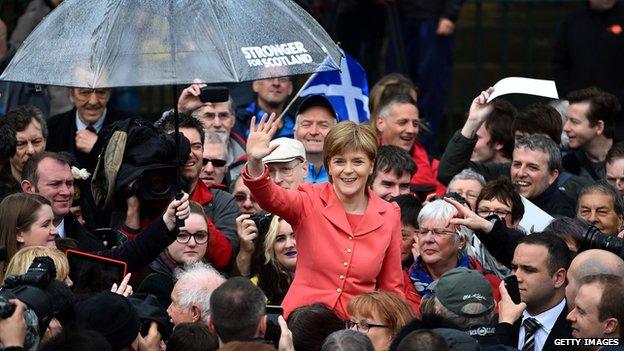
Job: SNP leader since 2014
Age: 44
Electoral history: Elected to the new Holyrood parliament in 1999 aged 29 as a Glasgow regional MSP. When the SNP won the Scottish elections in 2007, she became Scotland's deputy first minister and health secretary. After Scotland voted No to independence in September, she took over the SNP leadership from Alex Salmond and became Scotland's first minister.
How did her campaign go? Nicola Sturgeon was seen as the success story of the election campaign. The SNP soared in the opinion polls, triggering a Conservative attack on Ed Miliband's Labour, which faced repeated questions on how it would work with the nationalists in government. An attention-grabbing display in the first television debate boosted Ms Sturgeon's profile outside Scotland, and she followed it up by joining forces with Plaid Cymru and the Green Party to offer the Labour leader support to keep David Cameron out of Downing Street. Fearing a loss of support in England, Mr Miliband responded by ruling out any coalition or deals with the SNP.
And how did she do? Expectations were sky-high - but even so, she said, the results were "beyond her wildest dreams". Ms Sturgeon was not standing for a Westminster seat herself, but the SNP won 56 seats out of 59 in Scotland, leaving Labour, Lib Dems and the Conservatives with just one each.
Despite being unable to form a progressive alliance with other parties to "lock the Tories out", Ms Sturgeon said there was an appetite for change in Scotland and for its voice to be heard at Westminster and this was now the job of the 56 SNP MPs.
The party has faced repeated questions about whether it will push for a second independence referendum, and will have one eye on the 2016 Scottish elections.
It will certainly be pushing for constitutional reform.

Leanne Wood
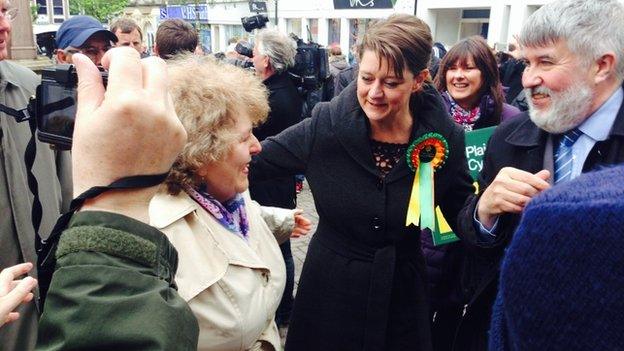
Job: Plaid Cymru leader since 2012
Age: 43
Electoral history: First elected to the Welsh Assembly in 2003, she has also held sustainability, environment, social justice, and housing portfolios. Her party had three MPs in the last parliament, and has 11 members of the Welsh assembly and one member of the European Parliament. The party promotes a left-wing politics aimed at increasing economic prosperity and social justice, and securing an independent Wales.
How did her campaign go? With opinion polls suggesting only modest support for independence, much of Plaid's campaign was focused on alternatives to austerity. Along with Nicola Sturgeon and Natalie Bennett, the televised debates gave her a new platform and her profile rose as she vowed to use her influence at Westminster to oppose Trident renewal and keep the Conservatives out of Downing Street. She also called for funding parity with Scotland, securing the backing of Nicola Sturgeon's SNP.
And what did she achieve? Overall, Plaid's share of the vote in Wales was 12% compared to 11% in 2010. It retained three seats but failed to make gains. Ms Wood said the result was "not as bad as it could have been" and had "laid some very good foundations for the assembly elections next year".

Natalie Bennett
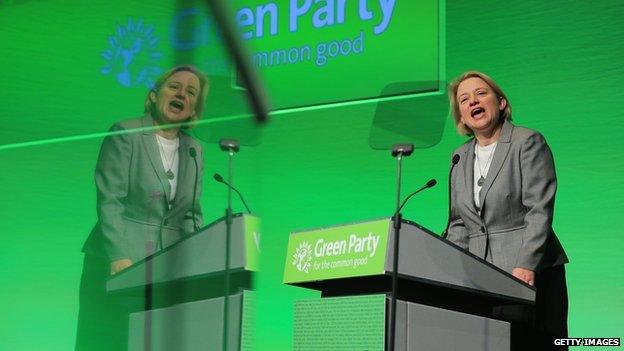
Job: Green Party leader since 2012
Age: 49
Electoral history: Ms Bennett was one of the candidates for the London seat of Holborn and St Pancras - she came third. Under her leadership, the Greens outpolled the Liberal Democrats at the 2014 European Elections, with three MEPs, and saw a large rise in membership this year.
How did her campaign go? The Greens sought to portray themselves as a fresh voice in British politics, and Ms Bennett formed an anti-austerity alliance with the SNP and Plaid Cymru. Her party was successful in its call to be included in the televised election debates, where Ms Bennett offered "an alternative to the politics of austerity". On the down side, there was a self-confessed "brain fade" in a radio interview when she failed to explain a key policy on house-building. The party's policies - including a universal "citizen's income" and an end to the banning of extremist groups - also came under increased scrutiny.
View from BBC correspondent June Kelly:
Natalie Bennett was one of the fresh faces of this election. Following in the trail of Caroline Lucas, an assured leader and media performer, was always going to be tough. Ms Bennett came a cropper before the campaign had begun, with a shambolic radio interview which she put down to "brain fade."
Natalie Bennett: "We are in a new place as the Green Party"
After that, her personal challenge was to demonstrate she was a competent leader with a grip on policy.
She stood in the central London seat of Holborn and St Pancras. This was safe Labour territory and she came third, ahead of the Lib Dems.
Like other leaders of the smaller parties, Natalie Bennett was given a more public platform in this ground-breaking election.
We were told voters were hungry for alternatives. The Greens' leader needed to capitalise on this and broaden the party's appeal. It appears they have increased their share of the vote, including in some of the big northern cities.
And crucially they have retained their tiny Parliamentary foothold of one MP, with Ms Lucas holding her Brighton Pavilion seat. But with their anti-austerity message , the only way Natalie Bennett and her party could wield any influence at Westminster was in a Labour led coalition.
Ms Bennett has made plain that she will remain as leader.